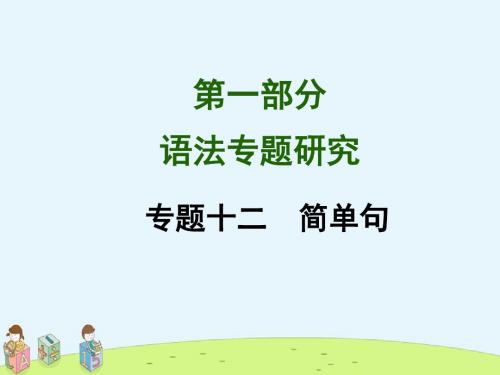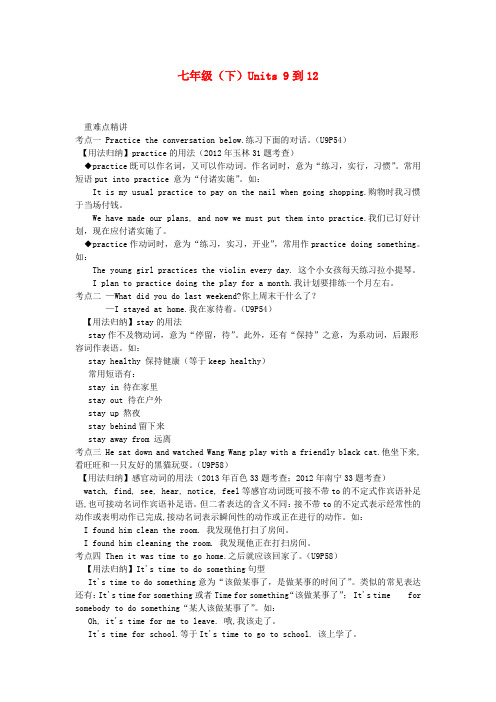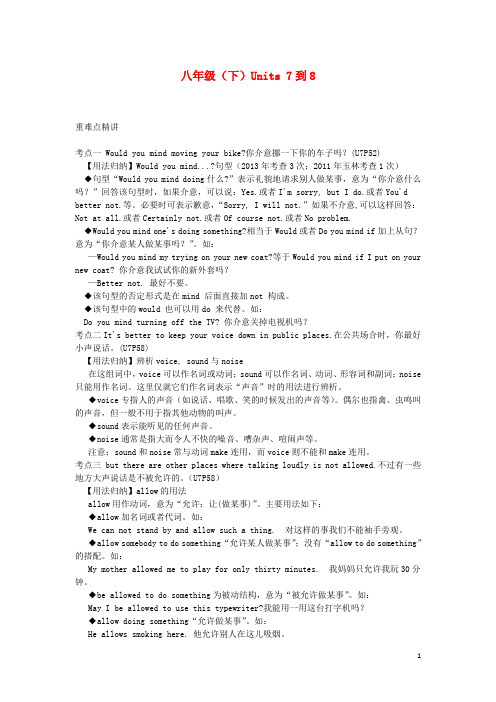广西学中考英语复习资料 初中英语句型大搜集
广西中考英语总复习 第一部分 教材知识梳理 九全 Units 910(1)

九年级(全)Units 9到10重难点精讲考点一It is used for scooping really cold ice cream.这是用来舀冰淇淋的。
(U9P69)【用法归纳】be used for的用法be used for表示“被用来做什么”,介词for表示目的或用途,后面接名词或动词的i n g形式。
如:Wood can be used for making paper.木材可以被用来造纸。
【知识拓展】含有be used的常用短语:◆be used as表示“被用作”,介词as是“作为”的意思,其后一般接名词,强调使用的工具及手段。
如:This book can be used as a textbook.这本书可以当作教科书来用。
◆be used by表示“被谁使用”,by后接动作的执行者。
如:This kind of machine is used by farmers for getting in crops.这种机器被农民们用来收割庄稼。
考点二 The potato chips were invented by mistake.薯条是在偶然的情况下被发明的。
(U9P71)【用法归纳】辨析invent, discover, create, find与find out◆invent 意为“发明,创造”,指通过研究和实验而“创造,发明”出前所未有的产品或装置。
如:He invented a new method to make bread. 他发明了一种做面包的新方法。
◆discover 意为“发现,找到”,表示发现过去就存在但尚未被人发现或知晓的事物,如地点、物体或事实等,名词形式是discovery。
如:Did Columbus discover America in fourteen ninty two? 哥伦布在1492年发现了美洲吗?◆create指从无到有“创作”或创作出原本不存在的东西,如艺术作品、理论等。
【精选】广西中考试题研究英语语法专题研究:专题十二简单句(含广西各地中考真题及原创题)

A. be
B. am
C. is
D. are
【解析】考查主谓一致的用法。句意为:不仅 我的朋友连我自己也对足球感兴趣,梅西是我 们最喜爱的明星。短语not only...but also...遵 循就近原则。因为but also后的主语是I,其后 的be动词要用am,故选B。
8. —Both Li Lei and Han Meimei
—In 2005. 2005年。
(3)疑问词组(共考查8次)
疑问词 含义
用法
how many 多少
提问数量,后跟可数 名词复数
how much 多少(钱) 提问数量,后跟不可 数名词;提问价格
how often 多久一 提问频率 次
how long
多长 提问持续的时间,答语用 时间 “for+一段时间”或
型三 (主+谓+宾) 歌。
基本句 S+V+IO+DO 型四 (主+谓+间宾
+直宾)
She showed her friends all her pictures.她向她 的朋友们展示了她的图 画。
基本句 S+V+DO+OC We keep our classroom
型五 (主+谓+宾+宾 clean and tidy.我们保持
注意:陈述句部分是否定结构时,反 意疑问部分用肯定式提问时,回答yes或no 与汉语正好相反。这种省略回答的yes要译 成“不”,no要译成“是”。
考点三 主谓一致和there be句型
考点抢测
5. Nobody except you _w__a_s_ (be) late for the meeting yesterday afternoon.
广西中考英语总复习 第一部分 教材知识梳理 七上 Units 712(1)

七年级(上)Units 7到12重难点精讲考点一 How much are these socks?这些袜子多少钱?(U7P41)【用法归纳】询问价格的句型(2012年柳州32题考查)◆“How much加上be 再加上主语(且主语通常是名词)?”是用于询问价格的常用句型,意为:“什么多少钱?”其中be动词的单复数由其后的主语来决定,如果主语是不可数名词或可数名词单数,一般用is;若主语是复数,一般用are。
如:—How much is that coat?那件大衣多少钱?—One hundred and twenty yuan.120元。
—How much are these black pants?这些黑色的裤子多少钱?—They are ten dollars.10美元。
◆另一个常用句型:“What is the price of 加上名词?”。
如:How much is the football?等于What is the price of the football?这个足球多少钱?【知识拓展】◆询问价格还可用句型“How much加上助动词(do或者does)再加上cost?”。
如:—How much does this sweater cost? 这件毛衣多少钱?—It is twenty dollars.或者It costs twenty dollars. 20美元。
◆“How much加上不可数名词”用于询问不可数名词量的多少。
如:How much bread do you want?你想要多少面包?◆询问可数名词的具体数目用“How many加上可数名词复数”。
如:How many students are there in your class? 你们班有多少个学生?考点二 Can I help you?我能帮你吗?(U7P43)【用法归纳】help的用法◆作动词,意为“帮助,援助”,常用于以下句型:help somebody to do something.也可省略to。
广西中考英语总复习 第一部分 教材知识梳理 八上 Units 79(1)

八年级(上)Units 7到9重难点精讲考点一 Turn on the blender.打开搅拌器。
(U7P41)【用法归纳】辨析turn on, turn off, turn up与turn down(2013年河池36题考查) turn on“打开(电器等)”turn off“关掉(电器等)”turn up“开大,调高(音量)”turn down“关小,调低(音量)”如:Miss Wang walked into the room and turned on the light.王小姐走进房间,打开了灯。
He turned on the computer and got online.他打开电脑上网。
注意:on, off, up, down这四个词都是副词,在使用过程中,当宾语为代词时,只能置于动词和副词之间;当宾语为名词时,既可置于动词和副词之间,也可置于副词之后。
如:Turn it on. 打开它。
Turn the gas off.等于Turn off the gas. 把煤气关了。
考点二 At the end of the day, the science teacher was very happy because the class monitor cleaned the bus after the trip. 在那天结束时,科学老师很高兴,因为班长在旅行后把车打扫干净了。
(U8P49)【用法归纳】辨析at the end of, by the end of与in the end◆at the end of “在什么末或者底”,既可接时间,也可接地点名词。
反义短语:at the beginning of “在什么初或者起点”。
◆by the end of “到什么末或者底为止”,常用于将来时或过去完成时。
◆in the end等于at last等于finally “最后”,常用于一般过去时。
广西九年级英语知识点

广西九年级英语知识点一、单词与词汇(Vocabulary)1. 名词(Nouns)在英语中,名词是用来指称人、动物、事物或抽象概念的词语。
名词可以分为可数名词和不可数名词两种类型。
可数名词可以用单数和复数形式表达,而不可数名词只有单数形式。
2. 动词(Verbs)动词是表达行为、状态或存在的词语。
动词在英语中有时态、人称和数的变化。
根据动词在句子中的用法可以分为主动语态和被动语态。
3. 形容词(Adjectives)形容词用来修饰名词或代词,描述或限定它们的特征或特性。
形容词可以用来比较或进行最高级形式的描述。
4. 副词(Adverbs)副词用来修饰动词、形容词和其他副词,表示时间、地点、方式、程度、频率等。
5. 介词(Prepositions)介词用来表示名词与其他单词之间的关系,如时间、地点、方向、原因等。
6. 冠词(Articles)冠词用来限定名词的范围,包括定冠词“the”和不定冠词“a/an”。
7. 代词(Pronouns)代词用来替代名词,以避免过多重复使用。
二、语法(Grammar)1. 时态(Tenses)英语中有多种时态,包括一般现在时、一般过去时、一般将来时、现在进行时、过去进行时、过去将来时等。
时态的选择取决于谓语动词所表示的时间。
2. 句型(Sentence Structures)英语中的句子有多种结构形式,包括陈述句、疑问句、祈使句、感叹句、条件句、比较句等。
不同的句型在语法结构上有所区别。
3. 从句(Clauses)从句是指在句子中起到某种语法成分,并且不能独立存在的句子部分。
常见的从句包括定语从句、名词从句、状语从句等。
4. 词性与词组搭配(Word Types and Collocations)在英语中,不同的词性和词组搭配会影响句子的语法正确性。
例如,动词需要与适当的介词搭配使用,形容词和副词需要放置在正确的位置等。
三、阅读理解(Reading Comprehension)1. 短文理解(Understanding Passages)阅读理解是理解和解释短文内容的能力。
【直击中考】广西中考英语总复习 第一部分 教材知识梳理 七下 units 9-12

七年级(下)Units 9到12重难点精讲考点一 Practice the conversation below.练习下面的对话。
(U9P54)【用法归纳】practice的用法(2012年玉林31题考查)◆practice既可以作名词,又可以作动词。
作名词时,意为“练习,实行,习惯”。
常用短语put into practice 意为“付诸实施”。
如:It is my usual practice to pay on the nail when going shopping.购物时我习惯于当场付钱。
We have made our plans, and now we must put them into practice.我们已订好计划,现在应付诸实施了。
◆practice作动词时,意为“练习,实习,开业”,常用作practice doing something。
如:The young girl practices the violin every day. 这个小女孩每天练习拉小提琴。
I plan to practice doing the play for a month.我计划要排练一个月左右。
考点二—What did you do last weekend?你上周末干什么了?—I stayed at home.我在家待着。
(U9P54)【用法归纳】stay的用法stay作不及物动词,意为“停留,待”。
此外,还有“保持”之意,为系动词,后跟形容词作表语。
如:stay healthy 保持健康(等于keep healthy)常用短语有:stay in 待在家里stay out 待在户外stay up 熬夜stay behind留下来stay away from 远离考点三 He sat down and watched Wang Wang play with a friendly black cat.他坐下来,看旺旺和一只友好的黑猫玩耍。
广西中考英语总复习 第一部分 教材知识梳理 八下 Units 78(1)

八年级(下)Units 7到8重难点精讲考点一 Would you mind moving your bike?你介意挪一下你的车子吗?(U7P52)【用法归纳】Would you mind...?句型(2013年考查3次;2011年玉林考查1次)◆句型“Would you mind doing什么?”表示礼貌地请求别人做某事,意为“你介意什么吗?”回答该句型时,如果介意,可以说:Yes.或者I'm sorry, but I do.或者You'd better not.等。
必要时可表示歉意,“Sorry, I will not.”如果不介意,可以这样回答:Not at all.或者Certainly not.或者Of course not.或者No problem.◆Would you mind one's doing something?相当于Would或者Do you mind if加上从句?意为“你介意某人做某事吗?”。
如:—Would you mind my trying on your new coat?等于Would you mind if I put on your new coat? 你介意我试试你的新外套吗?—Better not. 最好不要。
◆该句型的否定形式是在mind 后面直接加not 构成。
◆该句型中的would 也可以用do 来代替。
如:Do you mind turning off the TV? 你介意关掉电视机吗?考点二It's better to keep your voice down in public places.在公共场合时,你最好小声说话。
(U7P58)【用法归纳】辨析voice, sound与noise在这组词中,voice可以作名词或动词;sound可以作名词、动词、形容词和副词;noise 只能用作名词。
这里仅就它们作名词表示“声音”时的用法进行辨析。
广西中考英语总复习 第一部分 教材知识梳理 七下 Units 58(1)

七年级(下)Units 5到8重难点精讲考点一—How is the weather in Shanghai?上海的天气怎么样?—It is cloudy.多云。
(U6P31)【用法归纳】询问天气的常用句型句中“How is the weather in加上地点?”常用来询问天气,回答用“It is怎么样”。
询问天气的常用句型还有“What is the weather like in加上地点?”。
如:—How is the weather in Guilin today?等于What is the weather like in Guilin today? 今天桂林天气怎么样?—It is a beautiful day.晴天。
考点二There are many people here on vacation.许多人在这儿度假。
(U6P35)【用法归纳】on+名词的用法“on+名词”表示一种状态,常见的短语有:on holiday 在休假;度假等于on vacationon a visit to参观(某地)或访问(某人)on sale待售 on duty值日on leave休假 on show展出on fire着火 on business出差如:This old house is on sale.这座旧房子待售。
Who is on duty today? 今天谁值日?He has gone to Beijing on business.他去北京出差了。
考点三I am surprised they can play in this heat.令我吃惊的是他们能在这样炎热的天气下玩。
(U6P35)【用法归纳】辨析surprise, surprised与surprising◆surprise作名词,意为“惊奇,吃惊”,常用短语to one's surprise“让某人吃惊的是”;作动词,意为“使(某人)惊奇或吃惊”。
- 1、下载文档前请自行甄别文档内容的完整性,平台不提供额外的编辑、内容补充、找答案等附加服务。
- 2、"仅部分预览"的文档,不可在线预览部分如存在完整性等问题,可反馈申请退款(可完整预览的文档不适用该条件!)。
- 3、如文档侵犯您的权益,请联系客服反馈,我们会尽快为您处理(人工客服工作时间:9:00-18:30)。
初中英语句型大搜集
Lesson 1
关键句型全总结(一)
关键句型一:关于写信询问某事的句型
1.I'm writing to request more information about the day tour to London.
2. I'm writing for more information about the day tour to London.
关键句型二:关于询问具体细节的句型
1. I'd like to know if you have any special prices for students.
2. What about time for shopping? Is it included in the schedule?
3. As for lunch, is it included in the price?
4. Can you tell me more details about the trip?
5. Please let me know the scheduled return time.
6. I wonder if you could tell me more about the trip.
7. I also want to know how long the tour will last.
8. I have one final question, is there any time scheduled for shopping? Lesson 2
关键句型全总结(二)
关键句型一:表达个人观点的句型
1. In my opinion, …在我看来……。
2.As far as I am concerned,…就我看来……。
3. Personally,…我个人认为……。
4. From my point of view,…在我看来……。
5. I think (that)…我认为……。
6.As I see it.…在我看来……。
关键句型二:阐述论据的句型(以本题为例)
1. For one reason…For another reason…
一个大原因是……。
另一个原因是……。
2. What's more…此外…。
3. On the one hand, …on the other hand,…
一方面……,另一方面……。
Lesson 3
关键句型全总结(三)
关键句型一:表示肯定的句型
1. I'm sure you'll like the delicious Chinese food here!
2. I believe you will find Chinese food delicious.
3. I'm convinced that you'll love Chinese food.
5. I bet you will love Chinese food!
关键句型二:表示为某人提供某物
1. We'll provide you with a room of your own with a bed, a desk, a couple of chairs and a TV.
2. We'll provide a room with a bed, a desk, a couple of chairs and a TV for you.
3. We'll supply you with a room that has a bed, a desk, a couple of chairs and a TV.。
